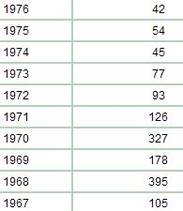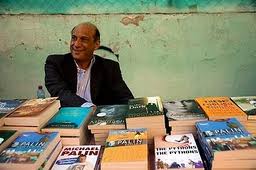Gilles Paris
"Munther est le fondateur et propriétaire de la librairie de l’ American Colony à Jérusalem-Est, lieu exigu mais vital de la pensée et du débat libres et indépendants" [1]
 Le sort de Munther Fahmi s’est sans doute joué dans la colonne ci-contre, qui égrenne les révocations de permis de résidence pour les Palestiniens de Jérusalem-Est décidées à partir de 1967 par les autorités israéliennes. Son cas exemplaire a suffisamment ému de grandes plumes d’Israël, Amos Oz et David Grossman, pour qu’elles se portent à son secours.
Le sort de Munther Fahmi s’est sans doute joué dans la colonne ci-contre, qui égrenne les révocations de permis de résidence pour les Palestiniens de Jérusalem-Est décidées à partir de 1967 par les autorités israéliennes. Son cas exemplaire a suffisamment ému de grandes plumes d’Israël, Amos Oz et David Grossman, pour qu’elles se portent à son secours.Car ce libraire installé en face du prestigieux American colony, hôtel où est installé Tony Blair, l’émissaire du Quartet, dans la partie orientale de Jérusalem conquise en 1967, est menacé d’expulsion de la terre qui l’a vu naître, conformément à un mécanisme d’une effrayante simplicité.
Comme la majorité des Palestiniens de Jérusalem-Est, Munther Fahmi, né en 1954, avait refusé la pleine citoyenneté après la conquête de 1967, qui passait par l’allégeance à l’Etat juif. Il s’était contenté d’un permis de résidence (ouvrant l’accès à des droits sociaux). Un permis retiré après un long séjour aux Etats-Unis, pays dont il avait reçu la citoyenneté. A son retour, dans les belles années des accords d’Oslo, il avait dû se contenter de visas touristiques de courte durée, dont l’octroi est devenu de plus en plus compliqué. Faute d’en obtenir un nouveau, il est menacé depuis quelques jours de devoir quitter définitivement les lieux. images. 

Le cas de Munther Fahmi a inspiré de nombreux articles dans la presse anglo-saxonne (lire aussi icihttp://www.newyorker.com/online/blogs/books/2011/03/fahmi-american-colony-hotel-jerusalem-deportation.html). Une pétition en ligne a été lancée pour tenter d’infléchir le cours des choses. De nombreux Palestiniens de Jérusalem-Est n’ont pas eu et n’auront pas cette chance ténue. [2]
[1] texte de la pétition en son soutien
[2] voir aussi en anglais :
Le libraire de Jérusalem
The bookseller of Jerusalem
It’s often the small injustices that stab us in the heart, even in a world of monstrous tsunamis, nuclear emergencies and despotic repression.
Last week, Munther Fahmi told me he is in imminent danger of deportation.
Fahmi, a friend for the past 15 years, is a bookseller in Jerusalem.
One might better say he is the bookseller there, since his shop is almost the only serious foreign-language one left in a city that once boasted many.
Fahmi’s store is in the tranquil courtyard of the American Colony, the foreign correspondents’ hotel and one of the few established meeting- places of Israeli Jews and Palestinians.
The store’s eclectic stock reflects its cosmopolitan clientèle.
Works by Israeli and Arab novelists and poets rub shoulders with nonfiction representing every political point of view. For anyone with a serious interest in Middle Eastern literature, history or politics, the place is an oasis of civilized reflection in a landscape brutalized by national and religious antagonisms.
Fahmi was born in Jerusalem. In 1967, after Israel conquered the eastern half of the city, he, with the rest of the Arab population, was issued an identity card recognizing him as a resident. In 1975 he left to continue his university education in the US. He graduated, started a business and a family, and acquired US citizenship. Then, in 1994-5, intoxicated with the prospect of peace after the signing of the Oslo Accords, he flew back to Jerusalem to set up the bookstore.
Upon arrival at Ben-Gurion Airport he was told that his Jerusalem ID was being revoked, and that the only way he could now enter was as a tourist. Over the next decade and a half he continued to do that, as there seemed to be no way to reinstate his right of residency.
About two years ago, the border agents started giving him a hard time whenever he entered or left.
Then he was told that he would henceforth be allowed to stay for no more than three months in any given year.
He started legal proceedings, but his suit against the Interior Ministry failed when the court invoked a law that strips the right to remain in Israel from any resident who leaves for seven years or more and holds a foreign passport. Most non-Israeli residents of Jerusalem, of course, are Arabs, since Jews who live in the city are generally citizens. The law is therefore applied mainly against Arabs.
FAHMI APPEALED to the Supreme Court which, a few weeks ago, ruled against him. The court advised that his only recourse would be to write again to the Interior Ministry, requesting that it reinstate his residency. He did so a few days ago. If the ministry rejects his request, he will be deported, and his bookstore will presumably have to close.
A petition in support of Fahmi’s right to live permanently in Jerusalem has gained support from over 2,000 signatories, including not only usual suspects like Amos Oz and David Grossman but also the director of the Jerusalem Book Fair, Zev Birger, former deputy defense minister Ephraim Sneh, and former editor-in-chief of this newspaper Ari Rath The Interior Ministry is hardly celebrated for its enlightened attitudes - particularly under the current minister, Eli Yishai of Shas. But quite apart from that, Fahmi’s plea to remain in the city of his birth has little prospect of success. The reason is that his case is not unique. It is an open secret that Israel has for years pursued a systematic policy aimed at countering what is seen as the demographic threat posed by the high Arab birthrate in the city. A few years ago the Palestinian-British professor Musa Budeiri was saved from expulsion in similar circumstances only with the personal intervention of the then-British prime minister, Tony Blair.
This is not merely a matter of individuals. The inability of Arabs to acquire building permits in the city has been a running scandal for years. The so-called security barrier which runs through, not just around, the municipal area, leaves thousands of Arab residents in Shu’afat, Kafr Aqab, Semiramis and part of Walajeh on the outside, effectively deprived of municipal services. Most Jewish Jerusalemites are not even aware that their so-called "reunified" city is, in fact, divided in this way. Thousands of children are currently barred admission to the overcrowded Arabic- language city schools in east Jerusalem. The long-term objective of all this is transparent : to extrude as many Arabs as possible from the city.
Fahmi’s case is thus part of a larger set of policies that threaten to sweep away any lingering hope of peaceful coexistence in Jerusalem. That is why this injustice against a bookseller should affront decent-minded people everywhere - perhaps even in the Interior Ministry.
BERNARD WASSERSTEIN
The writer is Ulrich and Harriet Meyer Professor of Modern Jewish History at the University of Chicago, and the author of Divided Jerusalem : The Struggle for the Holy City (Yale University Press).
publié sur le blog du Monde "Guerre ou Paix"
intro et ajout de note : CL, Afps
